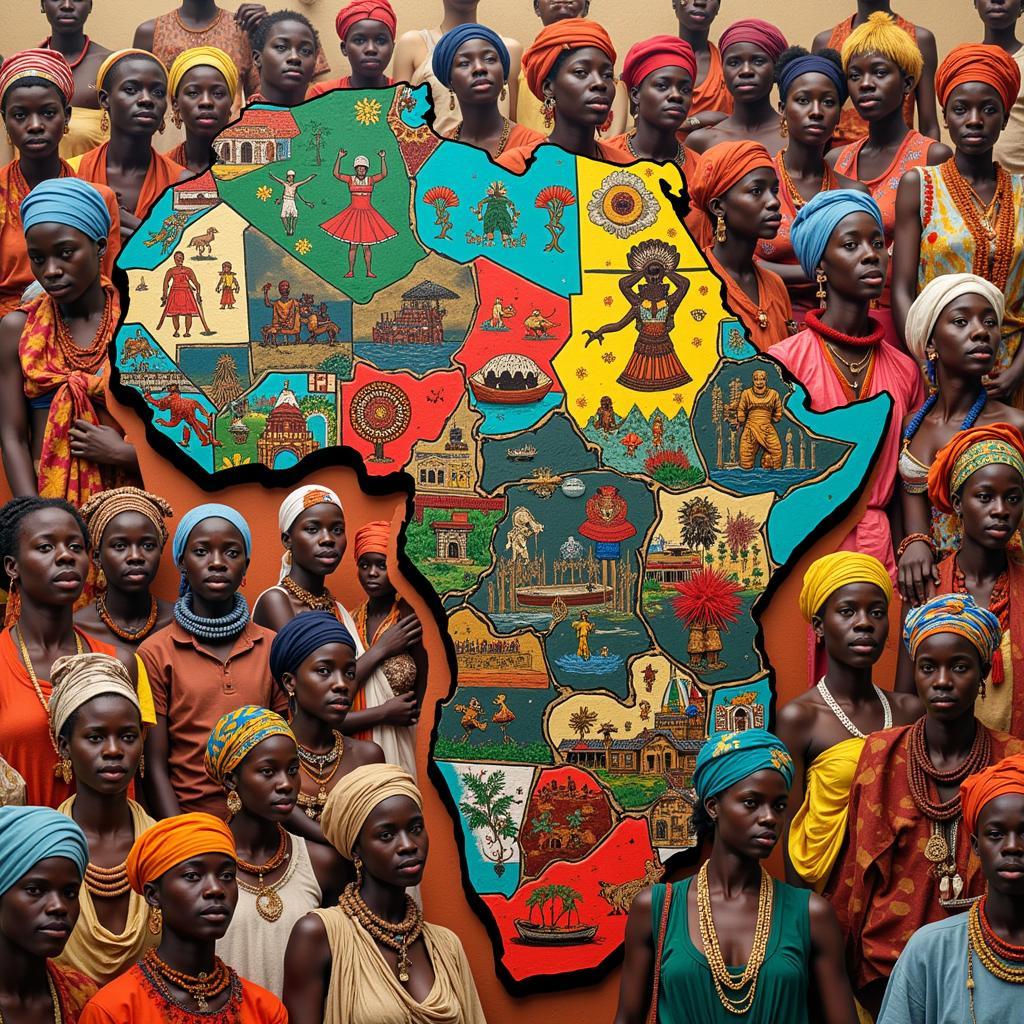African Buffalo vs Cow: A Clash of Titans
African Buffalo Vs Cow – two bovine behemoths, yet worlds apart. While both contribute significantly to their respective ecosystems, their physical attributes, behavior, and ecological roles differ vastly. This article delves into these differences, exploring the unique characteristics that define each species.
Size and Strength: Buffalo vs. Cow
The sheer size difference between an African buffalo and a domestic cow is striking. Buffaloes are significantly larger and more muscular, boasting a robust frame designed for survival in the African wild. A mature bull can weigh up to 2,000 pounds, dwarfing even the largest breeds of domestic cows, which typically top out around 1,600 pounds. This difference in weight, coupled with thicker hides and powerful horns, gives the buffalo a distinct advantage in terms of strength and defense.
Horns: A Defining Feature
While both animals possess horns, their shape and purpose differ. Domestic cows typically have smaller, more curved horns, primarily used for defense against predators or during disputes within the herd. African buffalo, on the other hand, are equipped with thick, fused horns that form a formidable boss on their forehead, providing extra protection against predators like lions and african hyena. These horns are not just for show; they are potent weapons capable of inflicting serious damage.
Habitat and Diet: Different Worlds
The contrasting habitats of these two bovines contribute significantly to their distinct characteristics. Domestic cows are typically found in managed pastures, their diet consisting primarily of grass and specially formulated feed. African buffalo, however, roam the savannas and grasslands of Africa, their diet consisting of a wider range of vegetation, including tougher grasses and shrubs. This dietary difference contributes to their robust digestive systems.
Social Structure and Behavior
African buffalo are highly social animals, living in large herds that can number in the hundreds. This herd mentality provides protection against predators and allows for cooperative grazing. Domestic cows, while also herding animals, tend to exist in smaller, more managed groups. The complex social dynamics within a buffalo herd, including hierarchical structures and cooperative defense mechanisms, are far more intricate than those observed in domestic cow herds.
Temperament and Aggressiveness
While both species can display aggression, the African buffalo is renowned for its unpredictable and often dangerous temperament. Referred to as “Black Death” or “the Widowmaker”, the African buffalo is responsible for more human fatalities in Africa than any other large mammal. Domestic cows, while capable of kicking or charging, are generally more docile, especially those bred for dairy or meat production. african bison weight can be substantial but pales in comparison to that of an African buffalo.
Conclusion: A Tale of Two Bovines
The African buffalo vs cow comparison highlights the fascinating diversity within the bovine family. While both share a common ancestor, their evolutionary paths have diverged significantly, resulting in two distinct species uniquely adapted to their respective environments. The buffalo’s size, strength, and aggressive nature make it a formidable force in the African wild, while the domestic cow’s docile temperament and adaptability have made it an invaluable agricultural resource for humans. african elephant weight and height might surpass that of the buffalo, but the buffalo remains a formidable creature.
FAQ: African Buffalo vs Cow
- What is the main difference in size between an African buffalo and a cow? African buffaloes are significantly larger and heavier than domestic cows.
- How do their horns differ? Buffalo horns are thicker, fused, and form a protective boss, while cow horns are generally smaller and more curved.
- Are African buffalo dangerous? Yes, they are known for their unpredictable temperament and are considered one of the most dangerous animals in Africa.
- What do African buffaloes eat? They primarily graze on grasses and shrubs in their savanna habitat.
- Why are African buffalo called “Black Death”? Due to their aggressive nature and the high number of human fatalities they cause.
- How social are African buffalo? They are highly social animals living in large herds for protection and cooperative grazing.
- Are domestic cows aggressive? While capable of aggression, domestic cows are generally more docile than African buffalo.
For further assistance please contact us:
Phone Number: +255768904061
Email: kaka.mag@gmail.com
Address: Mbarali DC Mawindi, Kangaga, Tanzania
We have a 24/7 customer service team.


